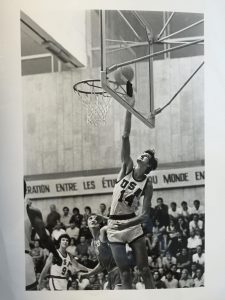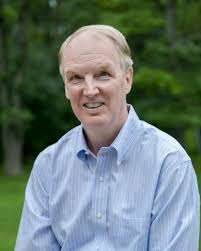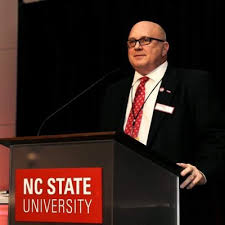The NBA Finals date back to 1947 (when they were known as the Basketball Association of America Finals) and the very 1st NCAA tourney was held in 1939. Olympic basketball competition is even older: it debuted as a demonstration event in 1904 and the men’s version became a medal sport in 1936, with the women finally getting their chance to go for the gold in 1976. The United States has dominated Olympic basketball competition from the start: the men have won 15 gold medals in the 18 tournaments they have participated in during the past 84 years, while the women have won 8 gold medals in the 10 tournaments in which they have competed during the past 44 years. Those of you who were looking forward to the 2020 Olympics opening ceremonies in Tokyo on July 24, 2020 will have to wait an extra 364 days, as the coronavirus caused a postponement until July 23, 2021. Due to the absence of college basketball since mid-March, HoopsHD’s Jon Teitel decided to fill the void by trying to interview as many prior Olympic players/coaches as possible so that you have something to read this summer while not watching the Summer Games. We continue our coverage by chatting with David Sweet, author of “Three Seconds in Munich: The Controversial 1972 Olympic Basketball Final”, and Tim Peeler, NC State Communication Strategist, about Tommy Burleson winning a silver medal in 1972. Today marks the 48th anniversary of Tommy scoring 5 PTS in a 67-48 win over Cuba in Olympic round-robin pool play.
 (photo credit: johnsoncitypress.com)
(photo credit: johnsoncitypress.com)
 (photo credit: lakeforestbookstore.com)
(photo credit: lakeforestbookstore.com)
Tommy was born/raised in North Carolina and was a Parade High School All-American: what made him choose NC State? David Sweet: His uncle Ben Ware was an alumnus of NC State. When Tommy was 6’8” (at age 14!) he visited the campus with his uncle. A bigger role was Tommy’s lack of self-confidence: he did not think that he was good enough to play at North Carolina or Duke so NC State became his best choice. Tim Peeler: When he was a kid he would come to campus every year for “Ag Week”. His uncle played football here and he would come down with his 4-H Club. In the 9th grade he stood 6’9” and told the coaching staff that he wanted to play there. They asked him to come back when he was a senior and when he said that he was just a freshman they became MUCH more interested. He was also recruited very hard to go to UNC but he wanted to go into an agricultural field so he always wanted to go to NC State. He had also become close friends with David Thompson, who was 1 year younger, and they made a pact to go to the same college. Tommy will still tell you that he is the reason David went there!
He was 7’2” but Norm Sloan and the rest of his coaching staff decided to list him as 7’4”: how much of his success was based on height vs. agility vs. talent? DS: I would say his talent along with the fact that he was disciplined and had tremendous desire. In the Olympic trials he competed against Ohio State’s Luke Witte, who was 18 months older and a dominant 7’ player…and Burleson outscored Witte 18-3! TP: 1 of the things that always bothered Tommy is that they listed him at 7’4” for publicity purposes to make him the tallest player in the country. He worked hard his entire life to make sure that people did not only know him for being tall: he does not get credit for being the athlete that he was. They also had the shortest player in 5’7” Monte Towe. Tommy led the ACC in PPG/RPG as a sophomore but when David came along Coach Sloan told him that he would not get as many PTS: it turned out okay for everyone.
He played for team USA at the 1972 Olympics and accidentally walked into a parking lot where Israeli hostages were brought before they were removed by helicopter from the Olympic Village: how terrified was he to be held at gunpoint by 1 of the terrorists, and how did he feel about losing the controversial gold medal game to the Soviet Union? DS: 40 years after he was held at gunpoint by a West German guard he broke down when recounting the experience of hearing the hostages sobbing as they walked to their deaths behind him. He was completely terrified during that moment in 1972. He did not play in the gold medal game because Coach Hank Iba had benched him for bringing his fiancée into the Olympic Village. That upset him greatly, as did the loss, but at least he felt better after winning an NCAA Championship in 1974. TP: He was sneaking back into the Village and was stopped and pushed up against the wall with a machine gun at the back of his neck. He was within sight of the helicopter and heard it fly off, then heard the explosion when it blew up. To this day he cannot tell the story without breaking down. Bill Walton did not play on the team but Tommy beat out Walton’s UCLA backup Swen Nater for the spot and relished the opportunity to play for his country. I joined him for the 40th anniversary of the 1972 team several years ago and had a great time.
He scored 10.1 PPG for Seattle in 1975 and was named to the All-Rookie team: how was he able to make such a smooth transition from college to the pros, and how frustrated was he to only play 7 seasons before having to retire due to knee injuries? DS: I believe that he was able to make such a smooth transition because he had good coaching at the college level, plus he had championship game experience in the Olympics/NCAA tourney. He was a fighter thanks in large part to the training he received from his dad, who was an Army Green Beret that entered Normandy on D-Day. He had to be frustrated to play only 7 seasons given his great talent. TP: He had worked so hard to get to where he was and could not have been coming off of a greater set of accomplishments then his performance in the 1974 ACC tourney title game win over Maryland (38 PTS/13 REB), then beating UCLA/Marquette in the Final 4. Once the knee injuries became prevalent he was not able to continue at that high level, which was harsh. His career was always defined by the unbelievable expectations placed on him due to his height: every time someone challenged him he far exceeded what they wanted him to be.
His career 1.3 BPG remains top-100 in NBA history: what was his secret for being a great shot-blocker? DS: I do not know if Tommy had a secret but his height/wingspan certainly played a large role! TP: There were taller players in the NBA who are on that list but shot-blocking is about timing/athleticism to be able to do it consistently. Walton learned in 1974 that it was hard to shoot over him but it was more than just height: it was will/ability.
In 2002 he was named to the ACC 50th Anniversary men’s basketball team and in 2013 he was inducted into the NC State Hall of Fame: when people look back on his career, how do you think that he should be remembered the most? DS: I do not think that his NBA career stands out in any way and he did not do much in the Olympics. Therefore, I believe that beating the vaunted 7-time-defending-champion UCLA Bruins in the Final 4 on the way to an NCAA title in 1974 is what he will be remembered for. He played tough against Bill Walton, the country’s best college basketball player, through 2 halves and 2 overtimes. NC State became the only team to deny UCLA a title during the era of John Wooden winning 10 titles during a 12-year period from 1964-1975 (the Bruins did not make the NCAA tourney in 1966 while Lew Alcindor was playing on the freshman team). TP: Tommy will always be remembered because he came from the mountains to become a part of what I think is the best ACC team ever assembled. They went 57-1 over 2 seasons and after he left they lost several more games. He comes down all the time to show his love for the university where both he and his uncle went to school. He won an NCAA title and did everything he dreamed of, and they love him as much for that as for his performance against Len Elmore in the ACC tourney.

